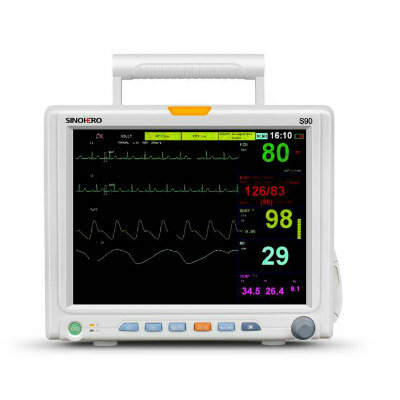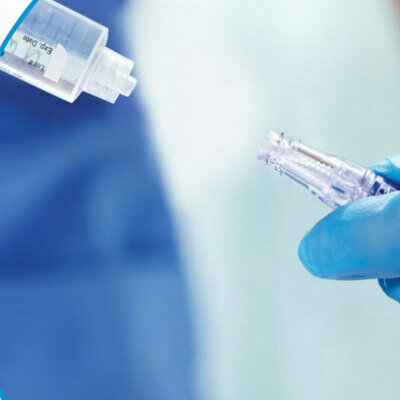Laser Therapy Plus Medication Effective for Angina
|
By HospiMedica staff writers Posted on 28 Nov 2000 |
A study has shown that catheter-delivered laser therapy combined with medication is more effective for treating angina in heart patients than medication alone. The procedure is indicated for patients with severe chest pain who cannot undergo angioplasty or bypass surgery. The study, conducted by researchers at Rush-Presbyterian-St. Luke's Medical Center (Chicago, IL, USA), was published in the November issue of The Lancet.
In the procedure, a cardiologist makes a small puncture near the patient's groin and steers a catheter through a blood vessel inside the heart. Once there, laser impulses create tiny channels in the heart muscle to promote better blood flow and angiogenesis. According to the developer of the procedure, it can be performed under a local anesthesia and is less invasive than other laser heart procedures, which require general anesthesia and a surgical incision.
The study involved 221 subjects with severe chest pain, of whom 100 were randomly assigned to receive the procedure, called percutaneous transmyocardial laser revascularization (PTMR) along with medication such as a calcium channel blocker, while 111 received the medication alone. After 12 months, the patients who received both PTMR and medication showed an 89-second improvement (without chest pain) over their baseline treadmill test, compared to only 12 seconds for the medication-only group. More than a third of the PTMR patient group reported their chest pain decreased from severe categories to more moderate while only 13% of the medication-only group said their chest pain improved. The PTMR procedure was developed by Eclipse Surgical Technologies (Sunnyvale, CA, USA).
"for these people, who are severely ill and suffering from debilitating chest pain every day, this procedure can vastly improve their quality of life,” said Michael J. Quinn, chairman and CEO of Eclipse.
Related Links:
Eclipse
In the procedure, a cardiologist makes a small puncture near the patient's groin and steers a catheter through a blood vessel inside the heart. Once there, laser impulses create tiny channels in the heart muscle to promote better blood flow and angiogenesis. According to the developer of the procedure, it can be performed under a local anesthesia and is less invasive than other laser heart procedures, which require general anesthesia and a surgical incision.
The study involved 221 subjects with severe chest pain, of whom 100 were randomly assigned to receive the procedure, called percutaneous transmyocardial laser revascularization (PTMR) along with medication such as a calcium channel blocker, while 111 received the medication alone. After 12 months, the patients who received both PTMR and medication showed an 89-second improvement (without chest pain) over their baseline treadmill test, compared to only 12 seconds for the medication-only group. More than a third of the PTMR patient group reported their chest pain decreased from severe categories to more moderate while only 13% of the medication-only group said their chest pain improved. The PTMR procedure was developed by Eclipse Surgical Technologies (Sunnyvale, CA, USA).
"for these people, who are severely ill and suffering from debilitating chest pain every day, this procedure can vastly improve their quality of life,” said Michael J. Quinn, chairman and CEO of Eclipse.
Related Links:
Eclipse
Latest Patient Care News
- Portable Biosensor Platform to Reduce Hospital-Acquired Infections
- First-Of-Its-Kind Portable Germicidal Light Technology Disinfects High-Touch Clinical Surfaces in Seconds
- Surgical Capacity Optimization Solution Helps Hospitals Boost OR Utilization

- Game-Changing Innovation in Surgical Instrument Sterilization Significantly Improves OR Throughput
- Next Gen ICU Bed to Help Address Complex Critical Care Needs
- Groundbreaking AI-Powered UV-C Disinfection Technology Redefines Infection Control Landscape
- Clean Hospitals Can Reduce Antibiotic Resistance, Save Lives
- Smart Hospital Beds Improve Accuracy of Medical Diagnosis
- New Fast Endoscope Drying System Improves Productivity and Traceability
- World’s First Automated Endoscope Cleaner Fights Antimicrobial Resistance
- Portable High-Capacity Digital Stretcher Scales Provide Precision Weighing for Patients in ER
- Portable Clinical Scale with Remote Indicator Allows for Flexible Patient Weighing Use
- Innovative and Highly Customizable Medical Carts Offer Unlimited Configuration Possibilities
- Biomolecular Wound Healing Film Adheres to Sensitive Tissue and Releases Active Ingredients
- Wearable Health Tech Could Measure Gases Released From Skin to Monitor Metabolic Diseases
- Wearable Cardioverter Defibrillator System Protects Patients at Risk of Sudden Cardiac Arrest
Channels
Critical Care
view channel
Ingestible Smart Capsule for Chemical Sensing in the Gut Moves Closer to Market
Intestinal gases are associated with several health conditions, including colon cancer, irritable bowel syndrome, and inflammatory bowel disease, and they have the potential to serve as crucial biomarkers... Read moreNovel Cannula Delivery System Enables Targeted Delivery of Imaging Agents and Drugs
Multiphoton microscopy has become an invaluable tool in neuroscience, allowing researchers to observe brain activity in real time with high-resolution imaging. A crucial aspect of many multiphoton microscopy... Read more
Novel Intrabronchial Method Delivers Cell Therapies in Critically Ill Patients on External Lung Support
Until now, administering cell therapies to patients on extracorporeal membrane oxygenation (ECMO)—a life-support system typically used for severe lung failure—has been nearly impossible.... Read moreSurgical Techniques
view channel
Pioneering Sutureless Coronary Bypass Technology to Eliminate Open-Chest Procedures
In patients with coronary artery disease, certain blood vessels may be narrowed or blocked, requiring a stent or a bypass (also known as diversion) to restore blood flow to the heart. Bypass surgeries... Read more
Intravascular Imaging for Guiding Stent Implantation Ensures Safer Stenting Procedures
Patients diagnosed with coronary artery disease, which is caused by plaque accumulation within the arteries leading to chest pain, shortness of breath, and potential heart attacks, frequently undergo percutaneous... Read more
World's First AI Surgical Guidance Platform Allows Surgeons to Measure Success in Real-Time
Surgeons have always faced challenges in measuring their progress toward surgical goals during procedures. Traditionally, obtaining measurements required stepping out of the sterile environment to perform... Read moreHealth IT
view channel
Printable Molecule-Selective Nanoparticles Enable Mass Production of Wearable Biosensors
The future of medicine is likely to focus on the personalization of healthcare—understanding exactly what an individual requires and delivering the appropriate combination of nutrients, metabolites, and... Read more
Smartwatches Could Detect Congestive Heart Failure
Diagnosing congestive heart failure (CHF) typically requires expensive and time-consuming imaging techniques like echocardiography, also known as cardiac ultrasound. Previously, detecting CHF by analyzing... Read moreBusiness
view channel
Expanded Collaboration to Transform OR Technology Through AI and Automation
The expansion of an existing collaboration between three leading companies aims to develop artificial intelligence (AI)-driven solutions for smart operating rooms with sophisticated monitoring and automation.... Read more

















